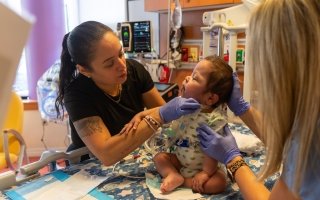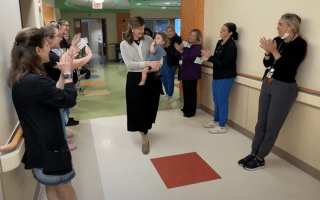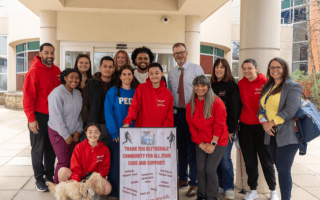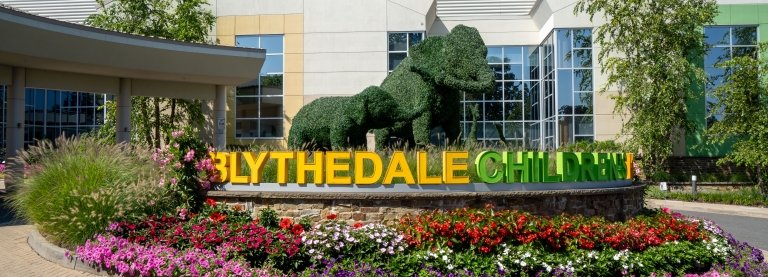Brandon's New Heart
Brandon is an 11-year-old who lets nothing slow him down - not even a heart transplant. He was born with multiple congenital heart defects, including heterotaxy, a rare condition which is characterized by septal defects and valve disorders, and an inability to productively return blood from the lungs to the heart. Brandon has required multiple surgeries throughout his life and was placed on the list for a heart transplant. Two years ago, he suffered a stroke and as a result developed weakness on the left side of his body. That’s when the staff at Blythedale first got a chance to meet Brandon.
Brandon was admitted to the Inpatient Hospital for comprehensive rehabilitation and medical management of his complex condition. When he was well enough to go home, he was transferred to Blythedale's Day Hospital. Through intensive therapies following the stroke, he made significant gains and returned to his baseline, but his heart was unable to keep pace.
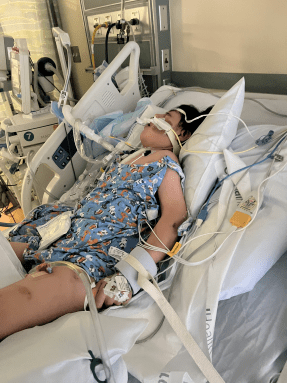
In November of last year, Brandon received a new heart at NewYork-Presbyterian Columbia Children’s Hospital of New York. Once Brandon's fragile condition stabilized, he was re-admitted to Blythedale’s inpatient hospital for comprehensive cardiac rehabilitation and medication management post organ transplant.
Brandon’s multidisciplinary clinical team worked together to help Brandon get back on his feet. He received physical and occupational therapy to strengthen his deconditioned body and improve the residual weakness on his left side. Challenges like obstacle courses improved Brandon's ability to walk, and playing games like Suspend, Uno Attack and Connect Four helped with his fine motor movements. The Pharmacy team oversaw his complex anti-rejection medication regimen, and the clinical team monitored him closely for any possible signs of rejection.
For transplant patients, ensuring that a new organ is accepted by the body is critical. Blythedale’s team worked closely with the Cardiology team at CHONY to make sure that his post-transplant recovery was on track.
"[Brandon] worked with us to try to ensure that he wasn't going to reject the heart," said Dr. Kathy Silverman, Unit Chief, Adolescent, Pediatric and Traumatic Brain Injury Units at Blythedale. "This requires careful follow up with his cardiac team over at Columbia. It's an essential coordination of services between the teams that have to take care of him."
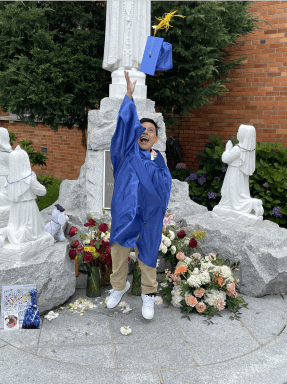
Brandon is eager to return to his community school where he graduated from the fifth grade last June. But ensuring his safety is crucial and both clinical teams worked with the family to have Brandon transition to Blythedale’s Day Hospital program to ensure they could monitor him closely for a little while longer.
"Brandon worked very hard in his therapies and he is mature beyond his years," said Dr. Silverman. "He is a pleasure to work with, he's doing great, and now he's finally able to go home and transition to our Day Hospital."
Blythedale’s Day Hospital program allows patients to attend the on-site Mount Pleasant Blythedale School with medical oversight from physicians, nurse practitioners, and support staff, while also receiving therapies, and getting to go home at night. With a full medical unit on-site at the Day Hospital, the team is set-up to be able to assist patients with complex needs, like Brandon.
"A lot of these children who are post-transplant with pretty significant immunosuppression end up with home instruction and some therapies either in the home or in the community, depending on where they live and what they really need," said Dr. Divya Lakhaney, Unit Chief of the Robert Stone Day Hospital. "In our Day Hospital program he's going to able to go to school and be with his peers, which I think is a huge benefit, especially for a child who's been in the medical system as frequently as he's been and had to miss a lot of school in his lifetime. While he is immunocompromised, we are going to be watching him quite closely and we can intervene very quickly if we need to."
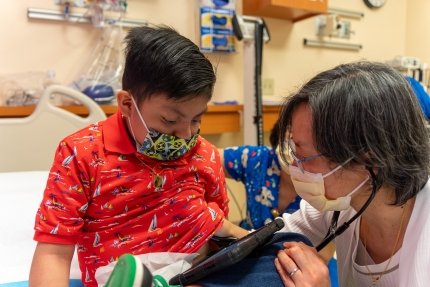
Dr. Lakhaney emphasized the importance of being in close communication with his cardiology team at CHONY.
"If he needs changes to his medication, he needs to go up or down on his immunosuppression, we can do that here," she said. "On the community side, you would need an order from a doctor. Here, they can easily tell us, 'Hey, by the way, we're adding this new medication or restricting fluid or something pertinent to his heart' and we can make those changes and monitor him closely."
The teams at both sites will continue to work together closely until he hits the crucial six-month mark where he’ll be able to transition back to his community school and rejoin his peers for the remainder of the school year.
As for Brandon's future, he has big plans.
"My future?" he asked. "I want to go to Disneyland with my family and friends and spend time with them."
